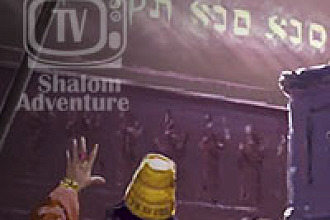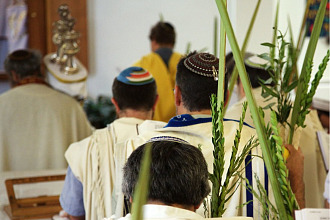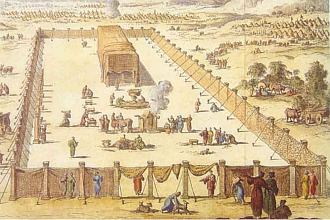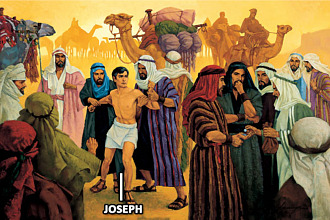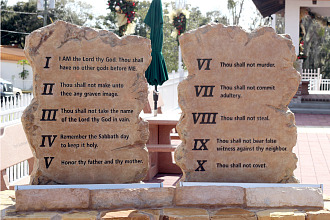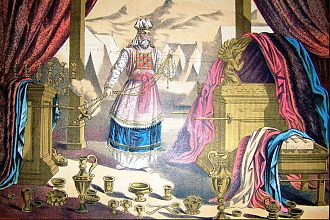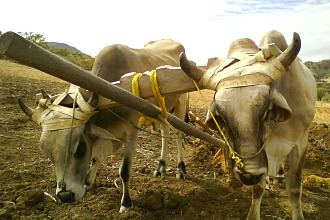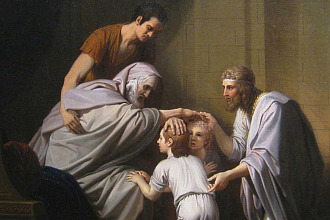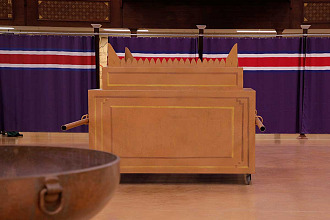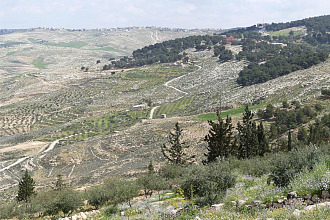Parasha for the Week: Bechukotai: Leviticus 26:3 - 27:34.
Haftarah: Jeremiah 16:19 - 17:14.
Apostolic Writings: Mark 3:13 - 30.
Overview
The Torah promises prosperity for the Jewish people if they follow G-d’s commandments. However, if they fail to live up to the responsibility of being the Chosen People, then chilling punishments will result. The Torah details the harsh historical process that will fall upon them when Divine protection is removed.
These punishments, with the purpose of bringing the Jewish people to repentance, will be in seven stages, each more severe than the last. Sefer Vayikra, the book of Leviticus, concludes with the details of erachin -- the process by which someone vows to give the Beit Hamikdash (the Temple) the equivalent monetary value of a person, an animal or property.
Walking
Our parasha begins with the verb HaLaCH (walking): “If you walk in My statutes” (Leviticus 26:3). This verb HaLaCH means to move toward a goal. Thus, Halichah commonly denotes the effort to attain possessions and pleasures that satisfy man’s needs and desires. A person’s moral integrity depends on the purity of this effort. We can conclude with Rabbi Hirsch that this beginning phrase of the verse means: “If in satisfying your physical needs and aspirations, you move strictly within the limits drawn in my Torah” the blessings will follow.
Blessings and Punishments
After describing the many blessings which will come as a result of observing G-d’s commandments, the Torah describes the punishments which will befall the Jewish people if they (G-d forbid) abandon G-d’s commandments. “But if you will not listen to Me, nor carry out all these mitzvot, and if you reject My statutes and if your soul abhors My ordinances, so that you do not keep all My mitzvot, but instead break My covenant, then I will do the following to you in return. I will appoint terror over you, wasting disease and fever that will dim the eyes and cause the soul to pine away. You will sow your seed in vain, because your enemies will eat it” (Leviticus 26:14–16).
Twice in the Torah we find a detailed description of punishments -- called Tochacha -- for not observing the Torah. However, such punishment does not mean that G-d gives up His on people or cancels His covenant with Israel. In this parasha we have this statement from G-d “Yet for all that, when they are in the land of their enemies, I will not reject them, nor will I hate them into utter destruction, and break My covenant with them, for I am Hashem their G-d” (Leviticus 26:44). Since people may feel uncomfortable being called up to the Torah for a section that includes punishments, it is customary not to call up anyone from the congregation for this part. Instead, the one who is called for Aliyah takes the Torah and reads G-d’s promises.
Consequences of Our Actions
The Torah tells us the consequences of our actions: “if you reject My statutes and if your soul abhors My ordinances, so that you do not keep all My mitzvot, but instead break My covenant” (Leviticus 26:15). It is interesting that in many synagogues this portion is read in a low voice and often very fast.
The Chofetz Chaim gives an analogy of someone who had to travel on a dangerous path. It was on a very high and extremely narrow mountain, and he could easily trip and harm himself. So he decided he would wear a blindfold because it was too scary to watch! Anyone with intelligence will realize that this person is in greater danger by being unaware of their true situation. The same is true regarding our behavior in life. By realizing the consequences of our behavior, both bad and good, we will guard our behavior more closely and will gain immensely.
Haftarah: Jeremiah 16:19 - 17:14
This Haftarah in Jeremiah starts with blessings too, blessings that Jeremiah accept with gratitude (Jeremiah 16:19). Hashem is the only one we can trust, the one who strengthens the prophets, especially in difficult times; G-d is his “stronghold and his refuge” (Ps 28, 7-8; 59:11, 18-19). These express confidence in G-d, which was exactly what Jeremiah needed at this time, just before the Lord revealed the sin of Israel to him, as described in the chapter 17.
Then even though the prophet Jeremiah was sent to Israel, he had a vision on the conversion of the nations: “to You will the nations come from the ends of the earth” (Jeremiah 16:19a). Israel should be a light to the nations; therefore, it is not strange that the prophet is concerned with the destiny of the nations. These nations are not the closest neighbors of Israel; it is said they “come from the end of the earth.” These nations would discover that they have worshiped gods who don’t deserve to be called gods (Jeremiah 16:19b-20). They have followed the path of their fathers, and they discovered that their gods where nothing more than stones or woods crafted by man. Hashem, the G-d of Israel, will teach them about the truth (Jeremiah 16:21), even though the gospel was preached by Jews. In this way, Jews and Israel have been a light to the nations for two thousand year. We can say that -- if in the modern time, nations are coming to Him, it is not because Israel taught them, but it is Hashem who revealed himself to the nations. Of course he uses human instruments to do so, but these human instruments are mostly guided by G-d through visions and dreams to reveal G-d’s will to the nations.
Then the chapter 17 after describing the sin of Judah, the prophet describes the one who is faithful to G-d, the one who trust Hashem: “Blessed is the one who trusts in Hashem, whose confidence is in Hashem. For he will be like a tree planted by the waters, spreading out its roots by a stream. It has no fear when heat comes, but its leaves will be green. It does not worry in a year of drought, nor depart from yielding fruit” (Jeremiah 17:7–8). It is clear that we can accept the interpretation of Rashi that the curse and blessings of G-d are really in connection with the land. This text is about “bush in the desert, land where no one lives, tree planted by the waters, spreading out its roots, its leaves will be green, don’t feat about heat or drought, nor depart from yielding fruit.”
One of the Jewish commentators, the Malbim, in his commentary of this Haftarah “explains that the prophet discusses three approach to one’s faith in Hashem. One who places his total trust in Hashem. A second prevalent attitude comes from those of dual allegiance, who place their trust in Hashem and in their personal efforts. There exists yet a third attitude one who places total trust in his personal involvement without even including Hashem as a factor in the equation” (Torah.org). It is important to know where we stand before Hashem. Are we trusting him completely with the fullness of our faith? Or do we share this trust between Hashem, and human effort?
Apostolic Writings: Mark 3:13-30
The last chapters of Leviticus, Vayikra are difficult. This is because -- even though we are happy with the blessings -- the text gives us the curse and punishments for G-d’s people if they don’t obey G-d. First are the blessings of following G-d and his commandments (Leviticus 26:3-4). And then the consequences of running away from the L-rd (Leviticus 26:14-16).
In the text of the Besorah Yeshua continues his ministry, choosing his first talmidim and teaching the people who come to him. “Now He climbs up on the mountain and calls those He Himself wanted, and they came to Him. He appointed twelve (whom He also named emissaries), so that they might be with Him and He might send them to proclaim the Good News, and to have power to drive out demons” (Mark 3:13–15).
Here are the Jewish names of the talmidim of Yeshua: Shim’on, to whom he gave another name, “Kefa”; Ya’akov Ben-zavdai and Yochanan, Ya’akov’s brother -- to them he gave the name “B’nei-regesh” (that is, “Thunderers”); Andrey, Philipos, Bar-talmai, Mattatyahu, T’oma, Ya’akov Ben-halfai, Taddai, Shim’on Hakanay, and Yehudah from Kriyot” (Mark 3:16-19).
From the verse one of the chapter 2 we know that we are in Capernaum. Yeshua got his first disciples Peter-Shimon, Andrey, Yaakov-James, and Yochanan-John, from this town. It is a very nice small city, about 1500 inhabitants, on the sea shore. Since Capernaum is an exceptional location about 200 m (655 ft) below sea level, it enjoys a wonderful climate, 25 °C (77 °F) in winter time. Thus Yeshua who left Nazareth after hearing about the death of Jochanan HaMatbil (John the Baptist), and was welcomed by the family of Shim’on-Peter in his home decided to stay there as his home. It is said: “Then he went home” (20a). He was at home getting some rest and care from Peter’s mother-in-lawr. But Yeshua was so popular that he was never able to rest, “and again a crowd gathers so they couldn’t even eat” (Mark 3:20b).
Yeshua was very popular. The common Jewish people liked him very much; he had a way of teaching that no one could reach. He was tender and deep at the same time; he revealed things that Pharisees and Scribes were unable to teach. In comparison to Yeshua, the Torah scholars were ignorant. Yeshua taught on his own authority, while the Scribes and Pharisees were only quoting Rabbis as we can see in the Talmud “Joshua b. Gamala, of whom Rab Judah has told us in the name of Rab” (Bava Batra 21a). In contrast, Yeshua was teaching with authority, and at the end of his mission on earth he confirmed: “All authority in heaven and on earth has been given to Me” (Matthew 28:18). That is why the Besorah affirms: “And they were astounded at His teaching, for He was teaching them as one having authority and not as the Torah scholars” (Mark 1:22). His love for people was obvious: “When He saw the crowds, He felt compassion for them, because they were harassed and helpless, like sheep without a shepherd” (Matthew 9:36; 14:14). “Yeshua called His disciples and said, “I have compassion for the crowd,” (Matthew 15:32). We can add more examples from the words of the disciples about Yeshua, or his own words saying that he had compassion for the crowd; it was his way to say that he loved people.
In reaction of his love, compassion and empathy for the crowd, Yeshua received only contempt from the Torah scholars who heard him, “The Torah scholars who came down from Jerusalem said, ‘He’s possessed by beelzebul,’ and, ‘By the ruler of demons He drives out demons’” (Mark 3:22). Many times when Jews accept Yeshua as the Messiah, and start to think out of the box, Rabbis and leaders of the synagogues use the same argument: they are out of their minds, and here in the story of Yeshua, they said that so strongly that his own family started to believe it: “When His family heard about this, they went out to take hold of Him; for they were saying, ‘He’s out of His mind!’” (Mark 3:21). Myriam, his own mother knew who Yeshua was from just after his birth, when Yoseph and Myriam came to Jerusalem for the first born ceremony. They met the prophet Simeon who said to Myriam: “And even for you, a sword will pierce through your soul” (Luke 2:35). Myriam certainly taught her family and her other children about the special destiny of Yeshua, but now, they are in doubt. The Rabbis, Scribes and Pharisees were so strong, so sure in their affirmation, that his own family were tempted to believe them.
When people don’t understand something, they go directly to paranormal, and in this case of Yeshua, since they did not understand, they accused him of demoniac possession “He’s possessed by beelzebul.” This name for Satan is curious. It could refer to a G-d mentioned in the Hebrew Bible, “Now Ahaziah . . . sent messengers and instructed them, “Go inquire of Baal-Zebub the G-d of Ekron” (2 Kings 1:2). Baal which means “master” was a common name for the pagan gods, and Zebub is “prince” then the name of this god which symbolized Satan was “Master, the prince.” From Baal it became “beel” and “zebub” became “zebul,” and in the first century in Israel, this G-d Baalzebub, or Beelzebul became the representation of Satan.
Yeshua accepted that this name represents Satan and answered in a long speech: “He called them and began speaking to them in parables: “How can satan drive out satan? If a kingdom is divided against itself, that kingdom cannot stand. And if a house is divided against itself, that house will not be able to stand. And if satan has risen up against himself and is divided, he cannot stand but his end has come” (Mark 3:23–26). This answer calls on the Scribes and Pharisees logic and reasoning. How can Yeshua fight against demons if he was sent or if he acted in the name of the prince of demons? He completed his logical reasoning by another analogy: “no one can enter a strong man’s house to ransack his property, unless he first ties up the strong man. Then he will thoroughly plunder his house” (Mark 3:27).
And now he adds a crucial sentence that we should make an effort to understand. This is why he starts this sentence with the word Amen; it is a signal for his disciples to think deeply about it. “Amen, I tell you, all things will be forgiven the sons of men, the sins and whatever blasphemies they utter; but whoever slanders the Ruach ha-Kodesh never has release, but is guilty of an eternal sin!” (Mark 3:28–29) The Pharisees are blaspheming, Yeshua, the Messiah. More than that, G-d incarnated is accused of using the power of Satan to perform his miracles. It is a blasphemy against G-d himself. That is why Yeshua said that all sins will be forgiven, but not the blasphemy against the Holy Spirit (Ruach Hakodesh). It is the Holy Spirit who helps us to understand biblical realities and truths. If I oppose the Holy Spirit, nothing and no one else can help me to understand godly things. If I am opposing the Holy Spirit, he will not be able to speak to my mind and to give me light, to convince me of sins, of forgiveness, and I will never feel being forgiven in my heart (John 16:8-11).





